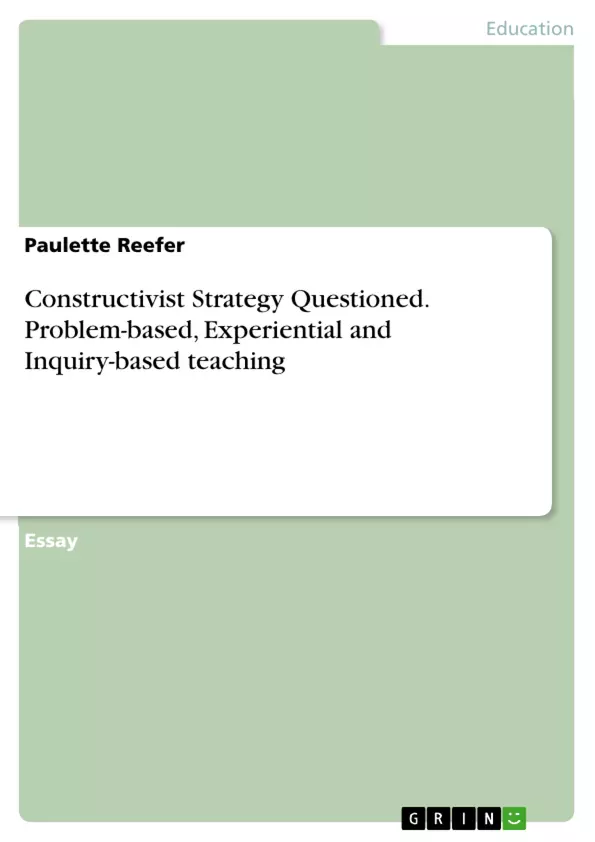The constructivist learning theory based on the psychological theory of the active construction of knowledge by the learner has been bandied by educators and researchers for several decades for use in the classroom as more successful than the traditional transmission model of teaching in virtually every discipline.
Often the discourse of the usefulness of the constructivist approach in pedagogy has been pedalled to both the practicing and neophytes’ teachers and lecturers as undisputed and capable of astounding results.
Teachers and lecturers, in response, often have simply incorporated some group work and project work in their courses and rationalised that this may be sufficient inclusion of a student centred approach without any greater understanding of what a constructivist approach to teaching or lecturing comprises. Granted that the majority of teachers are given inadequate training for the use of constructivist approaches, they have merely paid lip service to its use and have not in the majority of cases demonstrated the art of engaging with the constructivist approach to the maximum potential. A major problem with the implementation of constructivist approaches is the inadequate training and comprehension of constructivist strategies to be employed in subject-specific domains.
This paper offers an examination of the literature from the perspective of the problem of unsatisfactory implementation of constructivist strategies in the classroom.
Inhaltsverzeichnis (Table of Contents)
- What constructivist strategies can best be employed for improved academic writing at educational institutes?
- Constructivism as a theory of learning
- Minimal guidance does not work
- Good strategy instruction is in fact constructivist
- Problem-based learning
- Social constructivism
- Student writing in higher education
- Transformative Learning
- Teaching academic writing
- Self-regulated learning theories of academic achievement
- Constructive learning and its applicability to library instruction
- Research on learning to teach
Zielsetzung und Themenschwerpunkte (Objectives and Key Themes)
The primary objective of this text is to investigate the effectiveness of constructivist strategies in improving academic writing within educational institutions. The text explores various constructivist approaches and their implementation in different educational contexts, critically examining their strengths and weaknesses.
- The effectiveness of constructivist strategies in enhancing academic writing skills.
- The role of cognitive load and guidance in constructivist learning.
- The relationship between constructivist learning and self-regulated learning.
- The application of constructivist principles in different educational settings.
- The challenges and benefits associated with implementing constructivist approaches.
Zusammenfassung der Kapitel (Chapter Summaries)
- The text begins by introducing the constructivist learning theory and its potential benefits in educational settings. It highlights the limitations of traditional teaching methods and emphasizes the need for a more student-centered approach.
- This chapter explores the research that suggests minimal guidance in constructivist learning can be ineffective. It analyzes studies that demonstrate the importance of structured instruction and guidance in facilitating effective learning.
- This section examines the relationship between constructivist learning and effective strategy instruction. It highlights the importance of metacognitive and affective factors in student learning and emphasizes the role of teachers in providing clear and structured guidance.
- This chapter delves into the popular problem-based learning (PBL) approach and its application in various disciplines. It discusses the potential benefits of PBL, while acknowledging the need for further research on its long-term effectiveness.
- This section focuses on social constructivism, emphasizing the importance of shared knowledge construction and collaborative learning. It discusses the key elements of social constructivism and the ongoing debates within this theoretical framework.
- This chapter explores the challenges faced by students in academic writing, particularly in higher education. It examines the cultural and social factors that influence student writing practices and highlights the importance of understanding these factors in supporting student success.
- This section delves into the concept of transformative learning, highlighting its potential for empowering individuals through personal growth and knowledge transformation. It explores the process of transformative learning and its implications for educational practices.
- This chapter examines various approaches to teaching academic writing, including formalist, constructivist, and social constructivist approaches. It discusses the strengths and weaknesses of each approach and emphasizes the importance of integrating different methods to meet the diverse needs of learners.
- This section focuses on self-regulated learning theories, emphasizing the role of student agency and self-motivation in academic achievement. It explores the strategies employed by self-regulated learners and their implications for educational practices.
- This chapter examines the application of constructivist principles in library instruction. It highlights the benefits of constructivist learning in library settings, while acknowledging the challenges of implementing this approach.
- This section explores the research on learning to teach, focusing on the complexities of effective teaching practices. It emphasizes the importance of understanding the theoretical and practical aspects of teaching and the need for ongoing professional development.
Schlüsselwörter (Keywords)
This text focuses on the following key concepts: constructivist learning theory, academic writing, cognitive load, minimal guidance, strategy instruction, problem-based learning, social constructivism, transformative learning, self-regulated learning, and effective teaching practices. The text also delves into the intersection of these concepts in various educational settings.
- Citar trabajo
- Paulette Reefer (Autor), 2015, Constructivist Strategy Questioned. Problem-based, Experiential and Inquiry-based teaching, Múnich, GRIN Verlag, https://www.grin.com/document/342536



